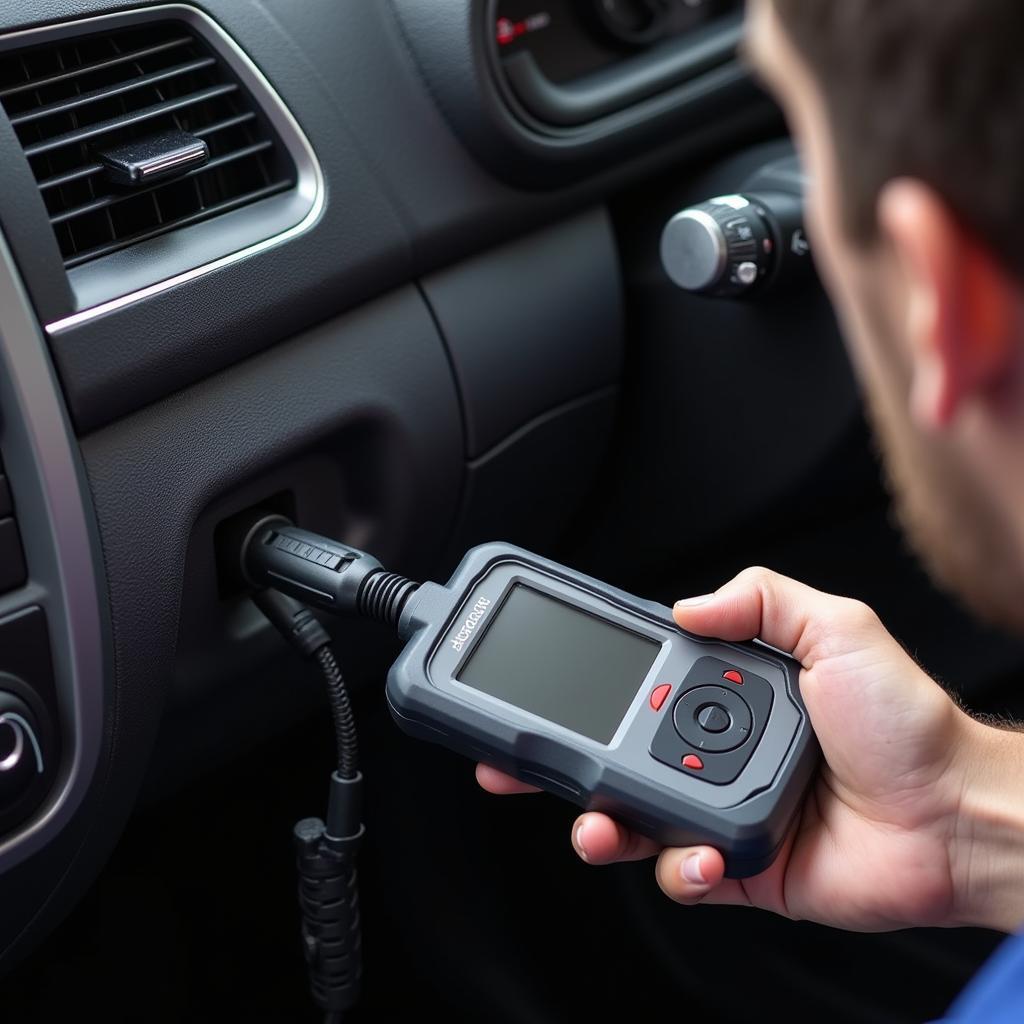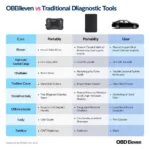Modern vehicles are more technologically advanced than ever before, integrating complex electronic systems that control everything from engine performance to safety features. This complexity necessitates specialized tools for accurate troubleshooting and repair, leading to the rise of sophisticated diagnostic systems for cars. These systems have revolutionized the way mechanics diagnose and fix car problems, making the process faster, more efficient, and more reliable.
What is a Car Diagnostic System?
A car diagnostic system is essentially the technological bridge between your car and a mechanic. It’s a sophisticated piece of software and hardware, often handheld, that connects to your car’s onboard computer – the Engine Control Unit (ECU) – to retrieve and interpret data about the vehicle’s health. This data is crucial in identifying malfunctions and pinpointing the source of problems within the intricate network of a car’s systems.
 Mechanic using a car diagnostic system
Mechanic using a car diagnostic system
How Diagnostic Systems Work: Deciphering the Language of Your Car
Imagine your car speaking a language only mechanics understand – that’s where diagnostic systems step in as translators. When you experience car trouble, the ECU stores a trouble code corresponding to the specific issue. Diagnostic systems for cars read these codes, much like a code reader deciphers a barcode, providing valuable information about the underlying problem. This information can range from simple issues like a loose gas cap to complex problems within the engine or transmission.
Types of Car Diagnostic Systems: From Basic Scanners to Professional Tools
The market offers a range of diagnostic systems, catering to both car enthusiasts and professional mechanics.
- Basic OBD2 Scanners: These affordable, entry-level scanners can read and clear basic trouble codes, primarily related to emissions. They are perfect for car owners who prefer to diagnose minor issues themselves.
- Mid-Range Diagnostic Scanners: Offering more advanced features, these scanners can access data from multiple vehicle systems, providing live data streams for deeper analysis.
- Professional Diagnostic Systems: Used by dealerships and professional mechanics, these high-end systems offer comprehensive coverage of all vehicle systems, including advanced programming and coding capabilities. They can access manufacturer-specific information and provide in-depth diagnostic reports.
Benefits of Using Diagnostic Systems for Cars
The adoption of diagnostic systems has brought about a paradigm shift in the automotive industry, offering numerous benefits:
- Fast and Accurate Diagnosis: Diagnostic systems eliminate the guesswork from car repair, providing accurate information about the problem, saving time and money.
- Comprehensive System Analysis: These systems offer a holistic view of the car’s health, going beyond basic engine diagnostics to assess various systems, including transmission, ABS, airbags, and more.
- Preventive Maintenance: By identifying potential problems early on, diagnostic systems enable proactive maintenance, preventing costly repairs down the line.
- Improved Efficiency and Productivity: For mechanics, diagnostic systems streamline the repair process, improving efficiency and productivity.
- Enhanced Customer Satisfaction: Faster and more accurate repairs, coupled with transparent diagnostic reports, lead to increased customer satisfaction.
Choosing the Right Diagnostic System for Your Needs
Navigating the world of car diagnostic systems can feel overwhelming. Here are some factors to consider when choosing the right system for your needs:
- Budget: Determine your budget and explore the features offered within that range.
- Vehicle Compatibility: Ensure the system is compatible with your car make, model, and year.
- Features: Identify the features most important for your needs, whether it’s basic code reading or advanced programming capabilities.
- User Friendliness: Opt for a system with an intuitive interface and easy-to-understand reports.
- Updates and Support: Check if the system offers regular software updates and reliable customer support.
lighting systems in cars diagnostic can also be diagnosed using these systems, providing valuable insights into electrical faults and ensuring optimal performance.
The Future of Car Diagnostics: Embracing Connectivity and Data
The future of car diagnostic systems is intertwined with the advancement of connected car technology. As cars become increasingly connected, diagnostic systems are evolving to leverage this connectivity for remote diagnostics, predictive maintenance, and even over-the-air software updates.
“The future of car diagnostics is about leveraging data to predict and prevent problems before they even arise,” says John Smith, a leading automotive technology expert. “We are moving towards a proactive approach to car maintenance, where car owners are empowered with real-time insights into their vehicle’s health.”
icarsoft multi-system car diagnostic tool mb v2.0 is a prime example of this evolution, offering comprehensive diagnostic capabilities and advanced features to stay ahead of the curve in car maintenance.
Conclusion
Diagnostic systems for cars have become indispensable tools in the automotive industry, transforming the way we diagnose and fix car problems. From basic code readers to advanced professional systems, there is a diagnostic system available to meet every need and budget. As technology continues to evolve, we can expect even more sophisticated diagnostic systems that leverage connectivity and data to provide proactive and predictive car maintenance solutions.
